The Galápagos Islands has a special place in the hearts of most ecologists and everyone that is interested in the biology science brances. For those unaware, these islands were the place where Charles Darwin observed how animals seemingly had adapted to their environment, which eventually lead to the evolutionary theory.
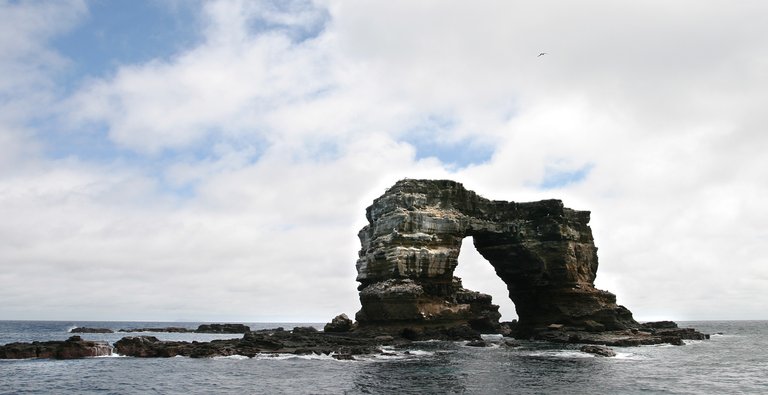
Darwins Arch, a landmark found just outside the Galápagos Islands. Image by refractor, posted with the Creative Commons Attribution 2.0 Generic license.
The Galápagos Islands were the origin for his brilliant theory for a good reason; they have a huge amount of endemic organisms - organisms that are only found on this one place, and not anywhere else. Isolated places such as islands often have a lot of endemic species compared to areas where the organisms can easily travel to and from, but the Galápagos Islands have even a much higher amount than most other islands.
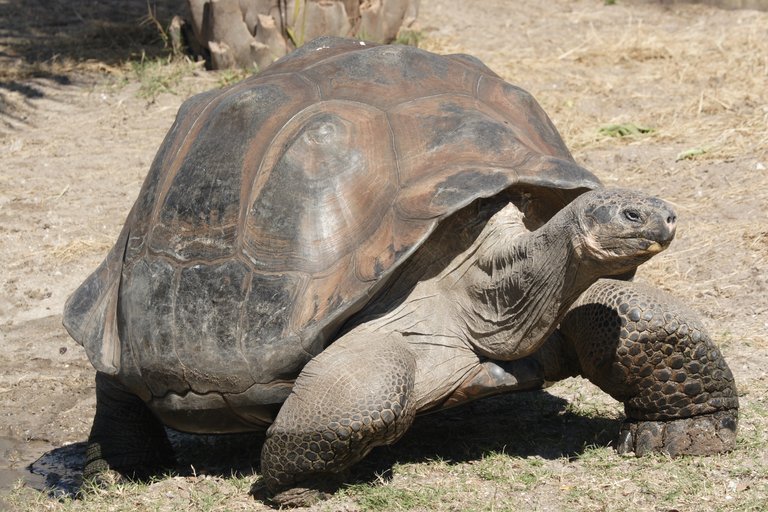
A Galápagos tortoise, one of the endemic species on the Galápagos Islands. Image by Matthew Field, posted with the Creative Commons Attribution-Share Alike 3.0 Unported license.
The group of islands are located about 1,000 kilometers off the coast of Ecuador, and are also owned by the same country. It became the first national park in Ecuador back in 1968, and was later also given status as a UNESCO World Heritage Site.
The national park covers 97 % of the islands’ land surface, and a huge marine reserve just outside the island is also protected. In total, over 138,000 square kilometers of marine ecosystems are protected by this marine sanctuary.
As you might expect, this type of protection means that the group of islands have gotten strict enforcements in place to prevent any loss of nature such as animals and plants. There are about 26,000 people who lives on the islands, and the entire national park has a strict limit as to how many people that can visit the park each year.
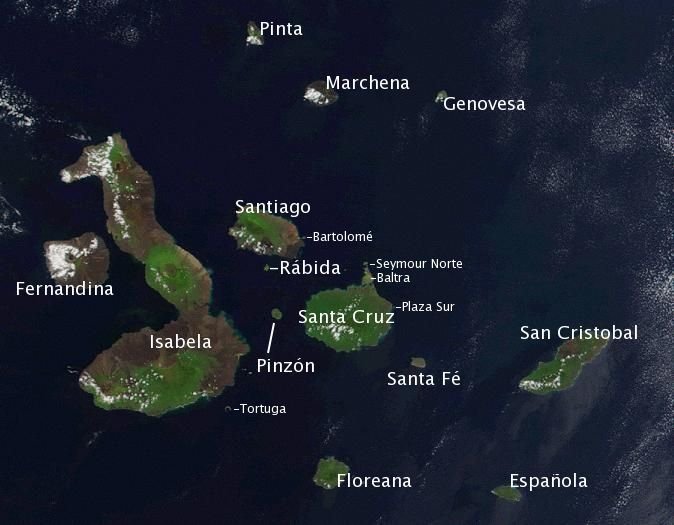
A satellite image of the islands. Image is Public Domain.
They authorities on the islands have also focused on providing the islands with renewable energy, and also banned all use of plastic bags. This was done to prevent plastic from ending up in the wild, or in the ocean, but sadly this did not really seem to matter all that much.
So far in 2018 over 22 tonnes (metric tons) of plastic have been cleaned from the coast
We would expect that there would not be a lot of plastic in the national park since the use of plastic bags is banned, and it is of course illegal to throw away plastic when visiting or living on the islands. Despite this, over 22 tonnes have been collected from the littered coast so far this year!
If anyone reads this in the future, the current date is only March 19th 2018, so we are only one quarter into the year.
A beach littered with plastic and other waste. Note; not the Galápagos islands. Image by U.S. Fish and Wildlife Service, posted as Public Domain.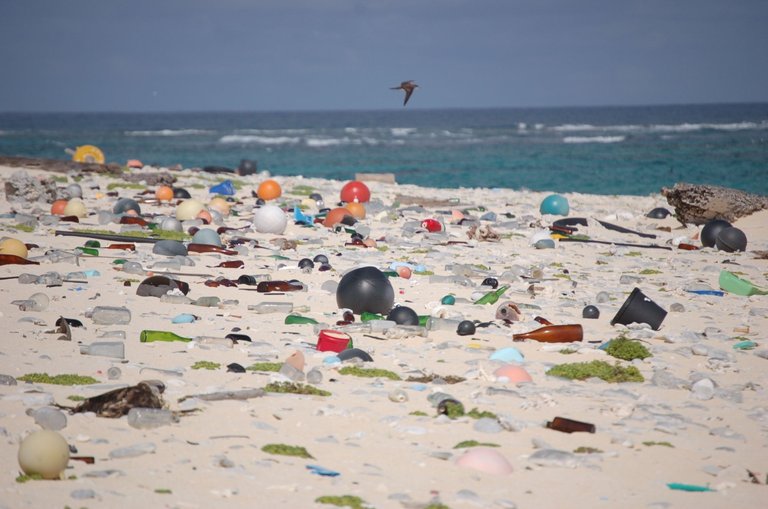
According to the park, the plastic has reached the islands by using ocean currents. Some of the plastic even has origins in Asia, which shows how far a single piece of plastic can travel after it has ended up in the ocean.
Sadly this means that even remote places such as these islands will still experience all the problems because of pollution in other parts of the world, which again is a good argument why stopping plastic pollution must be a global effort, and not something a single country or area can solve by itself.
Why the conservationists on the islands are extremely good at picking up the plastic
The park rangers and conservationists on the island fear that the plastic that gets carried all the way from other continents might contain invasive species, such as small invertebrates or even smaller things such as foreign types of algae.
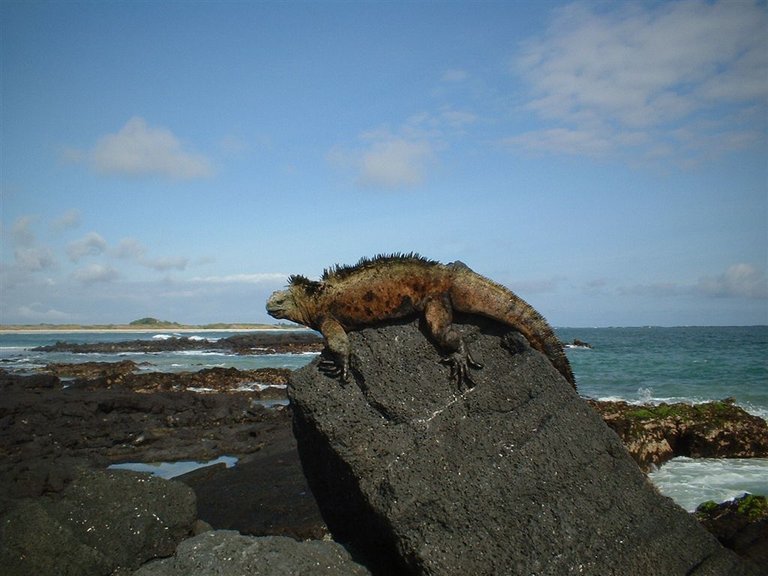
A Galápagos marine iguana, a species that could easily be disrupted if an invasive species enter its ecosystem. Image is Public Domain-
By removing the plastic waste as soon as possible, they minimize the chances of these potentially invasive species that are being carried by the plastic have a chance to establish a population on the islands. Even a single invasive species could totally destroy entire ecosystems on a pristine island such as one of the Galápagos islands, so it's really important to get rid of it as soon as possible.
While it's unfortunate that the islands get this much plastic, the government seem to do a really good job with cleaning it.
Thanks for reading
Thank you for checking out my post about the plastic waste that shows up on the pristine Galápagos Islands. I hope you enjoyed reading it.
About @valth
Hey, I'm @valth - the author of this post. I love to write about nature, biology, animals, nature conservation, ecology and other related branches of science, and I occasionally write about my life, about Steem or about random stuff as well. I'm trying my best to write at least one post every day, so make sure to give me a follow if you enjoy my content and want to see more of it.
Join the @valth community!
I love nothing more than to engage with my readers, so please join the @valth community in the comment section. You will definitely find more information about the topic, personal experiences, questions, and even opposing views down there, so don't miss out on learning more.
I always reward users who post good comments, so please take the opportunity to share your views and get a small upvote in exchange for it.
Unfortunately the Galapagos are directly impacted by the currents that have also helped form the South Pacific Garbage Patch. Until we start eliminating the sources of it into the ocean and find successful methods of cleaning such waste (there's a few in testing but I don't know if they've made much progress recently) the situation will only continue. Either way, the government will have plenty of practice cleaning beaches over the coming decades.
Well I would say hats off to the local authorities, park rangers and conservationists for keeping these islands pristine to the best of their abilities...Collecting 22 metric tons of plastic junk in just 3 months is not as easy as it seem, at all.
And remember even pristine islands are not immune to the oceanic plastic contamination, what would be the condition of other places that are not protected...
Yeah, they are doing an amazing job over there!
Yep, that's a good point I forgot when I wrote the post. Just imagine how terrible these islands would look if no one had removed the plastic; removing 22 tonnes in 1/4th of a year means 88+ tonnes per year, which is a huge amount!
I was going to ask if the plastic actually came from people on the island or elsewhere. We have a similar problem on one of the beaches on Christmas Island, seems like the currents are just right to wash absolutely everything that floats in the ocean there. The people that clean it up have a bit of an uphill battle.
Ouch, that's terrible. But yeah, some islands have a big problem with this due to the current, and getting rid of it is next to impossible. We have some of the same issues in certain parts of Norway as well due to the North Atlantic Drift, and the affected beaches can get cleaned one day only to be full of plastic the very next morning..
Yep that's pretty much the case here as well. Just have to keep plugging at it til a more permanent solution is found :/
Really positive that 22 mil. tons of plastic waste is collected so far, it really shows some dedicated people working to protect one of our most fragile and unique eco systems (and it means 22 mil less plastic in the sea)..
Immensely negative that 22 mil tons of waste had to be picked up by the before mentioned dedicated people..
More and more plastic bans appears all over the globe and that's amazing in itself, one question arise though: is it too little too late?
Yeah, it's a bit of a roller coaster with both positives and negatives :)
Hmm, that's a good question. A lot of damage has already been done, but a banning it at this point is a lot better than just keeping polluting with plastic. It has already done irreversible damage to a lot of species and ecosystems, but it could be a lot worse in the future if we don't act now.
There is no point in pointing fingers whodunit. It's all of us, almost 8 billion individuals putting out our waste everyday thrashing this planet to oblivion.
Good point. Plastic waste is a global problem, and pretty much all humans are responsible to some extent, and we can all improve.
Govt has taken a good step to overcome plastic pollution but it is duty of everyone to play their due role in this act.plastics are very much injurious to health for all living creature and even when they are burnt, their burning result in release of harmful chemicals
It is really sad to see our waste affecting innocent animals.
And although recovering the plastic manually is ok, if we want to completely fix this problems, we would have to develop technology specifically to accomplish this, which luckily is actually being developed right now
A nice post with not so nice news. It's heart breakingly to think about consequences of our modern and misguided lifestyle. At least there's a growing momentum worldwide to combat this problem. We must keep the conversation alive with posts such as this. Thanks for your words.
I'm glad you liked the post, despite the bad news. And I agree; we all need to spread awareness of the issues if we want to solve the problem.
I have read your previous articles about plastics and now these plastic have another danger that they might contain invasive species.
From all aspects plastics are dangerous for marine life for community.I think while concentrating on minimizing plastics .We all should not throw plastics in streams,rivers and oceans
Yep, I totally agree. The best way to stop this problem would be to stop using plastic for everything!
Garbage removal is a citizen responsibility.Water and air, the two essential fluids on which all life depends, have become global garbage cans.
Yeah, I agree. If everyone does their best to not pollute while also helping to remove all polluted plastic, we can get really far :)
Plastics in our oceans is a global problem because all rivers and oceans are interconnected with each other and there are a lit of countries that use plastics. As long as we keep using plastics more and more plastics reach the oceanevery single day. The global community must act upon this one. Starting from ourselves to persuade our blind governments about this.
Yeah, absolutely. We all need to work together if we want to solve the plastic problem!
=======================================================================================
This post was upvoted by Steemgridcoin with the aim of promoting discussions surrounding Gridcoin and science.
This service is free. You can learn more on how to help here.
Have a nice day. :)
Cool, thanks! I'll make sure to check out the project. I used to mine Gridcoin a little while back, but my outdated computer did not really give me a lot..
Yes sir,Galápagos Islands have even a much higher amount than most other islands.
Yeah, sure.
Being A SteemStem Member
Govt made a right choice by banning plastic and made the park restricted to limited tourist but still there is huge problem of plastic pollution.
According to the park, the plastic has reached the islands by using ocean currents.
How far plastic pollution travels in ocean is simply amazing. It reveals that plastic pollution is not the problem of one country or region. It is a global problem and the problem cannot be resolved with out effective ban on plastic usage near costal area and installing plastic reprocessing plant near costal area. Hats off to conservationist and local government to collect 22 metric ton plastic in less than 80 days. Who knows how many left behind in the ocean.